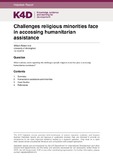| dc.contributor.author | Avis, William Robert | |
| dc.date.accessioned | 2019-11-01T11:49:52Z | |
| dc.date.available | 2019-11-01T11:49:52Z | |
| dc.date.issued | 2019-10-14 | |
| dc.identifier.citation | Avis, W. (2019). Challenges religious minorities face in accessing humanitarian assistance. K4D Helpdesk Report 666. Brighton, UK: Institute of Development Studies. | en |
| dc.identifier.uri | http://opendocs.ids.ac.uk/opendocs/handle/20.500.12413/14758 | |
| dc.description.abstract | This rapid literature review, surveys evidence regarding the challenges specific religious minorities face in accessing humanitarian assistance. This review acknowledges that there remains a paucity of research on the presence, scale and diversity of religious groups, experiences, values, motivations and engagements in a range of humanitarian contexts and how these intersect to mediate access to humanitarian assistance. The report also acknowledges that the complexity of settings in which humanitarian actors are operating often influences how assistance is provided. Experiences of persecution and active targeting of religious minorities must thus be understood alongside the politicisation of contexts in which access is often mediated by a range of state and non-state actors. More broadly, underpinning the provision of humanitarian assistance are a set of principles that govern the way humanitarian response is carried out. The four guiding principles are humanity, impartiality, independence and neutrality. Whilst these principles are long established, challenges in terms of their application and interpretation have beset the humanitarian community complicated by the complexity of contemporary humanitarian contexts. Interpretations of these principles also has particular relevance when considering the challenges that religious minorities face in accessing humanitarian assistance. More specifically, the increasing polarisation of societies in many contexts, often underpinned by deep underlying and unresolved tensions between majority and minority groups, have made religious minorities particularly vulnerable to violence, persecution and displacement – this polarisation has also influenced how access to humanitarian assistance is mediated. Indeed, disaster response processes often reveal the extent to which political and social dynamics criss-cross society, state and aid relations. | en |
| dc.language.iso | en | en |
| dc.publisher | IDS | en |
| dc.relation.ispartofseries | K4D Helpdesk Report;666 | |
| dc.rights.uri | https://www.nationalarchives.gov.uk/doc/open-government-licence/version/3/ | en |
| dc.subject | Aid | en |
| dc.subject | Rights | en |
| dc.subject | Security and Conflict | en |
| dc.title | Challenges Religious Minorities Face in Accessing Humanitarian Assistance | en |
| dc.type | Helpdesk | en |
| dc.rights.holder | © DFID - Crown copyright 2019 | en |
| dcterms.dateAccepted | 2019-10-14 | |
| rioxxterms.funder | Department for International Development, UK Government | en |
| rioxxterms.identifier.project | K4D | en |
| rioxxterms.version | VoR | en |
| rioxxterms.funder.project | 238a9fa4-fe4a-4380-996b-995f33607ba0 | en |

